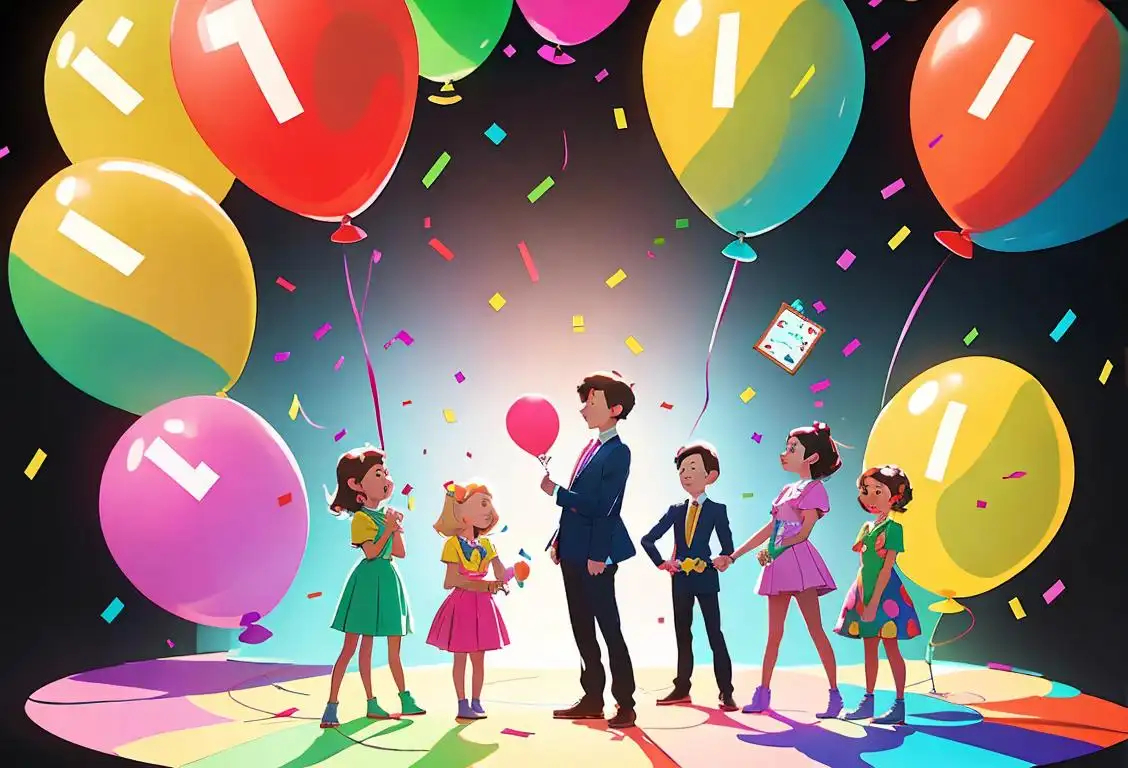National Lottery Day

Ah, National Lottery Day! The day when our dreams of luxury yachts, exotic vacations, and endless supplies of chocolate chip cookies could become a reality. Well, maybe not exactly, but we can always dream, right? National Lottery Day is all about celebrating the joy and excitement that comes with playing the lottery. So, grab your lucky charm, cross your fingers, and let's dive into the fascinating world of lotteries!
When is Lottery Day?
It's national lottery day on the 17th July.
The Origins of National Lottery Day
As with many national days, the origins of National Lottery Day are a bit murky. It seems to have sprung up spontaneously, fueled by the collective hope of winning big and the thrill of watching those magical numbers being drawn. Whether you play scratch-off tickets, pick your own numbers, or let fate decide with a quick pick, lotteries have been a popular form of entertainment for centuries.
Lotteries have a rich history that dates back to ancient times. Some believe that the Chinese were the first to embrace the concept of a lottery around 200 BCE, using it as a means to finance large infrastructure projects. As time went on, lotteries spread across the globe, with various forms of games and prizes.
A Worldwide Obsession
Lotteries have become a worldwide obsession, captivating the hearts and minds of people from all walks of life. Not only do lotteries provide a glimmer of hope and a chance to win big, but they also contribute to numerous charitable causes.
In the United States, lotteries have become a crucial source of funding for education, helping to provide resources and support to countless students. In fact, many states have designated specific days to celebrate their own lottery systems, showcasing their impact on local communities.
The Internet's Impact on Lotteries
The advent of the internet has revolutionized the way we play the lottery. Gone are the days of filling out paper tickets and waiting anxiously for the results to be announced on live television. Now, we can conveniently purchase tickets online, check our numbers with a few clicks, and even join international lotteries from the comfort of our own homes.
Online lottery platforms have made it easier than ever to participate in the excitement of playing the lottery. With just a few taps on your smartphone or clicks on your computer, you can enter the thrilling world of lottery games and potentially change your life forever.
Did You Know?
Did you know that the largest lottery jackpot in history was a mind-boggling $1.586 billion? That's right, billion with a 'B'! It happened in January 2016, when three lucky winners in California, Florida, and Tennessee shared the massive Powerball jackpot. Talk about starting the year on a high note!
History behind the term 'Lottery'
300 BCE
Early origins
The concept of the lottery can be traced back to ancient China, as early as 300 BCE. The Chinese were known to conduct a form of lottery called 'Keno,' where players would select numbers and win prizes based on the drawn numbers. Keno was initially used as a method to finance the construction of the Great Wall of China.
1515
The First Lottery in Europe
The term 'lottery' originated in Europe in 1515 when it was used to describe a public drawing of lots. This drawing involved the random distribution of prizes among participants, who had purchased a ticket or a share. It was a popular way to raise funds for various civic projects, such as building bridges and repairing city walls.
1446
First recorded lottery
The first recorded lottery was held in 1446 in the Low Countries (now Belgium, Netherlands, and Luxembourg). The lottery was organized by the widow of the Flemish painter Jan van Eyck to raise funds for the completion of the belfry in the city of Bruges. The prize was a luxurious painting, and tickets were sold to the public at various prices.
1434
First recorded lottery
The first recorded official lottery can be dated back to the Netherlands in the year 1434. The lottery was held in the town of Sluis as a means of raising funds for the poor and public works. Tickets were sold, and prizes included silver and other valuable goods. This marked the beginning of lotteries as a means of generating revenue for public purposes.
1515
National lotteries in England
In 1515, King Francis I of France established the first national lottery in Europe as a means to finance public works. This idea spread to England in 1566 when Queen Elizabeth I authorized the first official English lottery. The lottery was used to fund projects such as the repair of harbors, the building of bridges, and the establishment of schools and universities. It became a popular way for the government to generate revenue.
1612
Lotteries Reach England
In 1612, king James I of England introduced lotteries as a means to finance the struggling Jamestown colony in Virginia. This marked the beginning of lotteries in England, and they quickly gained popularity. The funds generated from lotteries were used for various purposes, including raising money for the military, supporting churches, and funding public works projects.
1612
Lotteries in the American colonies
Lotteries also had a significant impact on the development of the American colonies. In 1612, a lottery was held in Virginia to finance the settlement of Jamestown. The proceeds were used to support the infrastructure and promote colonization. Later, lotteries were used to fund the establishment of schools and churches, and even to finance the American Revolution. Lotteries played an important role in building early American society.
1732
The First State Lottery in America
The first state-sponsored lottery in America was established in Massachusetts in 1732. It was called the 'Land Bank Lottery' and aimed to raise funds for the state's debts. The lottery offered both cash prizes and land prizes, which attracted a large number of participants. This marked the beginning of lotteries becoming a common method for states to raise revenue in the United States.
1569
Lottery in England
Lotteries gained significant popularity in England during the Elizabethan era. In 1569, the first English state lottery was organized by Queen Elizabeth I as a way to finance various public projects, including the colonization of America. The lottery draw was held in London, and the prizes included cash and luxury goods.
1964
Legalization and Modernization
In 1964, New Hampshire became the first state to establish a modern lottery, offering regular drawings and large cash prizes. This led to a wave of lottery legalization across the United States, as more states saw the potential benefits of raising revenue through lotteries. Today, lotteries are legal in most states and have become an important source of funding for education, infrastructure, and other public programs.
19th century
Prohibition and resurgence
During the 19th century, lotteries faced opposition due to concerns about fraud and corruption. Many countries and states enacted laws to prohibit lotteries. However, in the early 20th century, the perception of lotteries began to change. Governments realized that lotteries could be a source of revenue and decided to reintroduce them under strict regulations. Today, numerous countries operate national lotteries, using the funds for public welfare, education, and other social initiatives.
1612
First recorded lottery in America
The first recorded lottery in America took place in Jamestown, Virginia, in 1612. The lottery was held to raise funds for the struggling Jamestown settlement. Tickets were sold, and the prize was 4,000 pounds of tobacco, a highly valuable commodity at the time. Lotteries became a common method of fundraising for early American colonies.
1994
Mega Millions and Powerball
In 1994, the first multi-state lottery game, known as 'The Big Game,' was launched. It later became 'Mega Millions,' and another popular multi-state game, 'Powerball,' was introduced. These games allowed for even larger jackpots and attracted millions of participants across multiple states. Mega Millions and Powerball are now two of the most well-known and widely-played lotteries in the United States.
Modern times
Online and international lotteries
In modern times, lotteries have evolved to include online platforms and international games. The introduction of online ticket sales has made it easier for people to participate. Additionally, international lotteries, such as Powerball and EuroMillions, offer enormous jackpots that attract players from around the world. These developments have made lotteries more accessible and increased their popularity, despite ongoing debates regarding their social impact.
18th and 19th centuries
Private lotteries and corruption
During the 18th and 19th centuries, lotteries became increasingly popular in Europe and America. However, due to lack of regulation, many private lotteries emerged, leading to corruption and fraud. This resulted in a negative perception of lotteries and calls for stricter regulations and government control.
1964
Modern lottery era
The modern era of lotteries began in 1964 when New Hampshire became the first U.S. state to establish a government-operated lottery. This marked a shift towards state-controlled lotteries, which aimed to provide revenue for public education and other public needs. Since then, numerous states and countries have adopted lotteries as a means of generating revenue.
Did you know?
Did you know that the largest lottery jackpot in history was a mind-boggling $1.586 billion?Tagged
fun financeFirst identified
24th April 2015Most mentioned on
17th July 2020Total mentions
182Other days
Opposite Day
Numeracy Day
Happiness Day
Suicide Prevention Month Day
Philanthropy Day
Honesty Day
Mathematics Day
Bison Day
Splurge Day
Veterans Day









